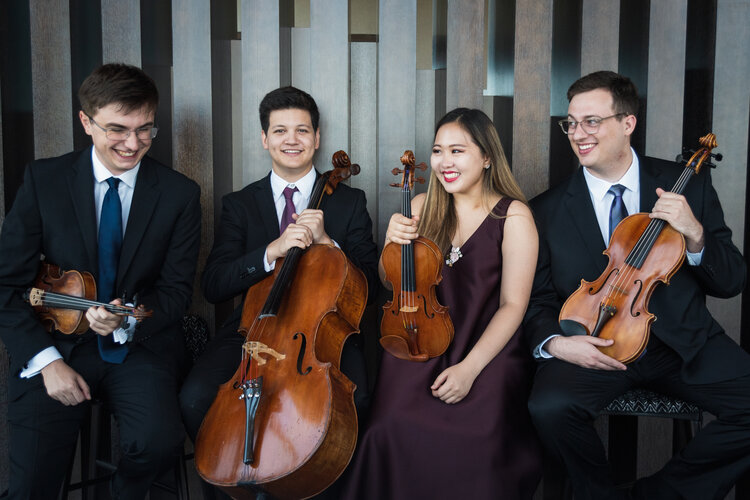by Mike Telin

After attending the Aspen Music Festival as a quartet and taking second prize in the Quartet Division at the 2019 Carl Nielsen Chamber Music Competition, violinists Angela Bae and Justin DeFilippis, violist Benjamin Zonnoni, and cellist Russell Houston decided to make their ensemble a full-time commitment.
“Just as things began to rev up, the pandemic hit,” Justin DeFilippis recalled during a recent Zoom conversation. “Fortunately we auditioned for the New England Conservatory residency program — which we are still part of — right before it hit. And we were accepted two weeks before everything shut down.”
On Monday, September 26 at 7:30 pm, the Boston-based Balourdet Quartet will headline the Rocky River Chamber Music Society’s new season at West Shore Unitarian Universalist Church. The free program, “Sunrise-sunset,” includes works by Debussy, Nina C. Young, and Brahms. Click here for the livestream.
DeFilippis said that March of 2020 was both interesting and scary for the ensemble. “We took time off as a quartet and for a while performed as a string trio. But once we got together again as a quartet, we spent six to eight hours a day together as a family unit rehearsing for an intensive period over the summer. Then we moved to Boston, and every performance we gave felt like a blessing because that had been taken away from us for an extended time.”
Since regrouping, the quartet has been full steam ahead. They received the Grand Prize at the 2021 Concert Artists Guild Victor Elmaleh Competition, the top prize awarded in the 2021 Premio Paolo Borciani in Reggio Emilia, Italy, the Gold Medal at the 2020 Fischoff Competition, and most recently Chamber Music America’s 2021 Classical Commissioning Grant.
When asked about their upcoming Rocky River program, DeFilippis noted that it begins with the Debussy Quartet, continues with Nina C. Young’s Memento Mori Phase I (2013), and concludes with Brahms’ Quartet No. 2 in a.
“It’s a progression toward the Brahms, and is musically tied to his circle of friends — the Schumanns and the violinist Joachim. There’s a lot of virtuoso first violin writing and Hungarian folk music, a nod to Joachim’s heritage,” DeFilippis said, adding that the piece also finds the composer in search of his own identity.
“It begins with Brahms ruminating in thought, and the second movement is full of tender, loving music that progresses into the final movement. The sunrise-sunset aspect is that the music goes through some places that are mysterious that probe deeper into the mind and subconsciousness. The last movement is raucous, fun, and in a way a triumphant end of the entire journey.”
The violinist said that the Debussy is in some ways a microcosm of the Brahms. “There are so many picturesque moments. Particularly during the third movement you can imagine a sunset over the water — we like to think of it as an ocean journey through storms and enchanted islands. The second movement is inspired by all kinds of world music and again, there is a sense of triumphant return in the last movement.”
DeFilippis said he doesn’t think there’s another piece for string quartet that sounds quite like Young’s Memento mori. “It has a very slow and fascinating progression. We describe it like being in a spaceship that is traveling incredibly fast, but all around you everything is moving incredibly slowly just because of the vastness of space. What she does is take the first notes of the Bach Art of Fugue subject and stretch them out over many minutes. You get the sense that time itself is skewed — what you get is a freeze-frame moment that is extended through a progression of episodes. It is one of her first major works and it’s received a lot of performances. The JACK and Aizuri Quartets have also played it.”
Our conversation moved on to the ensemble’s name. “There’s layers to that story too,” DeFilippis said. “Russell, Angela, and I all attended the wonderful Taos chamber music festival in New Mexico. It was held at the hotel St. Bernard for 50 or 60 years, and Antoine Balourdet was one of the chefs at the hotel we grew especially close to — he hung out with us. He was a music lover although not trained in music. We didn’t know him as Balourdet, we only knew him as Antoine, but Russell found his business card in his shoe one day, at the same time we were applying to Aspen and looking for a name.”
Although the past few years have been challenging, the ensemble is happy they decided to stick with it. He recalled their early experiences playing together. “Everybody has a unique skill set, which was very different from other groups I had been part of. It’s a unique dialogue that has only grown over time. I remember my dad came to our first recital and he told me, ‘You guys have a great energy together, you should really keep that going.’ And that’s what we’re always trying to refine.”
Winding down our conversation, DeFilippis said that it’s been exciting to see audiences come back to the concert hall. “We’re excited to be playing on the Rocky River series. We’ve looked at their past performances and they have presented some really great quartets.”
Published on ClevelandClassical.com September 21, 2022.
Click here for a printable copy of this article


